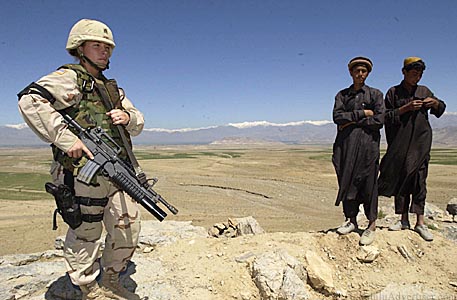 Another day in Afghanistan. After tribal militiamen in Khost province allegedly opened fire on NATO helicopters, returning fire left at least six dead. A funeral procession-turned-protest then carried the dead tribesmen, a key initiative of US General David Petraeus, to the provincial governor’s house.
Another day in Afghanistan. After tribal militiamen in Khost province allegedly opened fire on NATO helicopters, returning fire left at least six dead. A funeral procession-turned-protest then carried the dead tribesmen, a key initiative of US General David Petraeus, to the provincial governor’s house.Chanting “death to America" and "long live the Taliban.”
In typical Afghanistan fashion, the incident is a smoking mass of disorientation. Youqib Khan, the deputy provincial police chief, told reporters, "What I confirm now is six local security forces were killed by NATO's helicopters. NATO told us the militiamen fired first. We don't know who to blame.”
But judging by the reaction of both the militiamen and villagers, America appears the cause simply for existing in the country. George Soros’s Open Society Foundation is only the latest organization to report that the very presence of US troops legitimizes the Taliban’s actions to an extent. This presents a potentially unavoidable dilemma as Petraeus seeks to minimize civilian casualties.
The Foundation’s survey also reached several other conclusions likely unpopular with the US military. One is to stop the increased use of night raids as the “primary kill/capture mechanism,” a mechanism that has become the primary propaganda of US officials arguing that America is regaining “the momentum.” But Afghans including President Hamid Karzai claim night raids are incredibility antagonizing for villagers caught in the crossfire.
The Foundation advocates the establishment of an Afghan tribunal to authorize and investigate Special Forces raids, an unrealistic prospect. The program would include a national registry of civilian victims, cause of death and who is responsible to provide “greater political accountability.” The idea of a body investigating Afghan deaths has been floated by none other than the Taliban, although this may simply be for propaganda purposes, but some type of remedy is clearly necessary.
Wikileaks irreversibly exposed NATO’s policy of smudging the facts behind civilian casualties, a deadly perception that erodes the reduction in US-caused civilian casualties. The Open Society Foundation reports:
"Western public perceptions about the causes of instability in Afghanistan and the role of international forces and insurgents could be characterized as follows: 1) Insurgents treat the civilian population far worse than disciplined and professional international forces; insurgents are brutal in their intimidation and harassment of the population. 2) Insurgents are, quantitatively and qualitatively, more responsible than international forces for civilian harm and escalating the conflict.Another “suggestion” is to, “reconsider the new counterinsurgency strategy of pushing international troops closer to villagers until the population can be meaningfully protected from the increased insurgent violence, collateral damage from international forces, and broader humanitarian consequences that often accompany such troop movements.”
These baseline assumptions are not, however, shared by most Afghans. Most Afghans we spoke with believed the opposite to be true. They blamed insurgents for many attacks against civilians and other misconduct, but they did not think the international military had a much better record than insurgents, citing continued insecurity, detention abuses, air-strikes that killed civilians, and night raids that offended entire communities.”
This finding has Marjah and Kandahar written all over it. Most any report on these cities will include Afghans wondering why NATO stirs up a hornets nest that it can’t clear, let alone hold and build in. Thus when the Taliban increases its activity, the resulting civilian casualties are still partially attributed to the cause - foreign troops.
And more precautionary than coincidental or ironic, the Foundation’s study warns: “Exercise caution regarding initiatives that arm, train, or otherwise empower local militias. Past attempts have often resulted in the unintended side effects of empowering local warlords, leading to abuses of power, inflaming tribal rivalries, indirectly supporting insurgent groups, and otherwise feeding the conflict.”
Like shooting at a NATO helicopter, apparently a justifiable act to the people below.

No comments:
Post a Comment